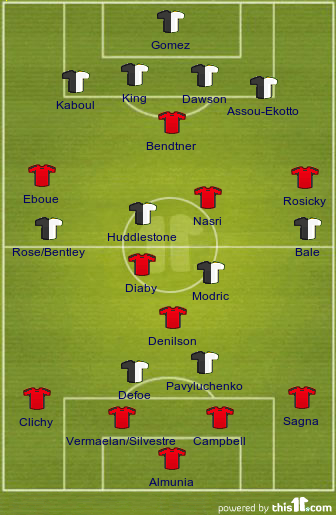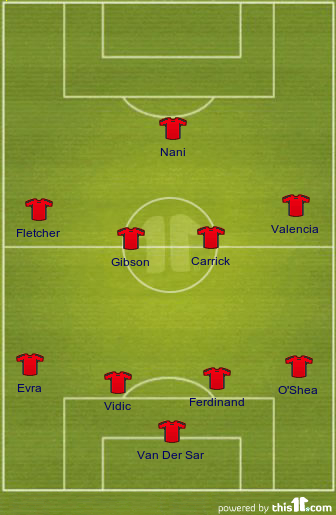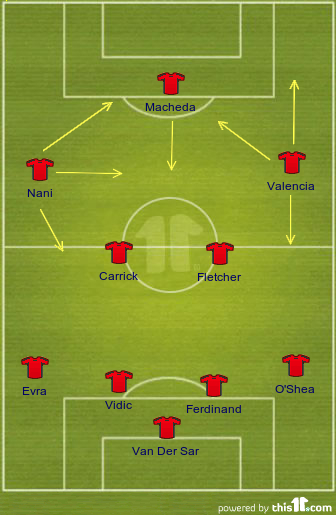Didier Drogba: destructive, direct, and at times "almost unplayable" as our pundits like to opine.
Drogba is Chelsea's top scorer this season by a wide margin, is a candidate for PFA Player of the Year, and with 25 Premier League goals he is still fighting it out with Wayne Rooney to be crowned Golden Boot winner for 2009/10. All in all a guaranteed starter in every match? I am not so sure. Whilst his statistics this season, and performances in certain matches, make this statement seem to fly in the face of evidence I believe that there are questions to be asked about his continued presence in the Chelsea starting XI.
Drogba's enforced absence due to the 2010 Africa Cup of Nations was thought by many to be the moment that the wheels would fall of Chelsea's title challenge. However during his absence Chelsea had the following results: Chelsea 5 - Watford 0, Chelsea 7 - Sunderland 2, Preston 0 - Chelsea 2, Chelsea 3 - Birmingham 0, Burnley 1 - Chelsea 2. As soon as Drogba returned Chelsea could only draw 1-1 away to Hull. In the period without Drogba Chelsea managed to win all five matches and scored 19 goals.
Admittedly those matches were not against what you would call stellar opposition so perhaps that explains that run of results? I am not so sure that the teams that were played necessarily explain those results. If we move to more recent times and look at two of Chelsea's best performances: Chelsea 7 - Villa 1 and Man Utd 1 - Chelsea 2, both of these results have something in common: the absence of Drogba from the starting line-up. Coincidentally two of Chelsea's worst recent performances (home against Bolton and away at Tottenham) have also coincided with the inclusion of the Ivorian from the start .
When Chelsea went to White Hart Lane, Drogba was included from the start and Anelka was relegated to the bench. As a result Chelsea proceeded to have one of their worst games of the season with Drogba completly ineffective against the solid Spurs backline of Kaboul, Bassong, Dawson and Assou-Ekkoto. In order to analyse the problems it is instructive to look at the Guardian chalkboards comparing Drogba's first half performance against Tottenham with Anelka's first half performance against Man Utd (thanks to Zonal Marking for this chalkboard).
by Guardian Chalkboards
As can be seen the movement of Anelka around the opposition half was very hard for Man Utd's defenders to track. Anelka managed to make 15 successful passes in a number of different positions. This movement helped Chelsea to play a very fluid system with Joe Cole having his best game since returning from injury and Malouda continuing his excellent form. By contrast the Drogba board highlights how ineffective Drogba was against Spurs. None of his passes were successful in the final third. Indeed it looks almost like an invisible wall is preventing Drogba from attacking the goal. I think that this is chart is symptomatic of Drogba's lack of mobility and fluidity of movement in comparison to Anelka and meant that Tottenham's two strong, tall centre-backs could deal with the aerial presence and feel comfortable that Chelsea's attack would be relatively static.
When Drogba has been good this season (especially against Arsenal) he has been a fantastic player to have in the team. However when he has been bad the whole Chelsea team has suffered as a result. When he is on the pitch there is always a temptation for players to smash the ball forward and hope Drogba can use some of his destructive pace and power to score a goal. Time after time this means that the team ends up resorting to crude, long-ball football when things do not seem to be going well. It is also hugely apparent that Anelka just does not work in the wide position that Ancelotti likes to use him in.
What has impressed me so much about Chelsea (without Drogba) has been the movement towards a fluid possesion style of football that seemed to be starting to separate Ancelotti's team from that created by Mourinho. During that ACN it appeared that Ancelotti had started to develop the team in his own image but with Drogba back in the side they have appeared to regress to their old habits.
I find it hard to say this about Drogba because he has been a great servant to Chelsea over the last six years. He is clearly an interesting man with a complex personality who can be both infuriating and exhilarating in the space of a few minutes but I think that if Chelsea are to really fulfill those glimpses of potential they have shown under Ancelotti this season Drogba, at 32 years old, will have to accept a place in the side as a game-changing substitute a la Inzaghi at Milan or he will have to be moved on to pastures new.
K.B.
Saturday, 24 April 2010
Friday, 23 April 2010
Friday, 16 April 2010
Same Old Arsenal, Always Losing (against well organised teams)
Arsenal once again proved that as a team they do not function well against a well-organised, defensively minded, team. Yes the goal from Danny Rose was a beauty but that was only the first sting in the tale. The second goal from Bale was more indicative of the game as a whole. Arsenal have once again been highlighted as a team with both a soft centre and an impossibly irritating tendency to over play in the attacking phase - regardless of whether this is a cliche or not.
The game started at a typically fast pace with Arsenal once again dominating possession. However as with Chelsea, Man Utd, and Man City, Tottenham were more than happy to let Arsenal keep the ball. They knew that as long as they kept their shape and pressed Arsenal they would be able to deal with their overwrought possession. Tottenham, to their credit, performed their allotted task admirably until they started to be stretched late in the game.
When the game was in full flow time and time again Tottenham took full advantage by attacking at pace after gaining the ball from Arsenal. Bale looked very dangerous going forward and Arsenal looked toothless. It goes without saying that Arsenal missed RvP (for most of the match), Fabregas, Arshavin, and Song but even with these players Arsenal have been found wanting at the highest level for the last couple of seasons. Their tendency to fail to use width for crosses, the need to pass the ball in squares around the box, and the lack of directness means that Arsenal get swamped by decent defensive units and then when they lose the ball their attacking players are in no position to help out defensively. This puts extra pressure on the Arsenal back four who unfortunately are nowhere near strong enough to cope with pace and power on the break.
Arsenal are a team that loves to keep possession and yet good teams (apart from Barcelona) always let them keep the ball because they know that quick, direct counter attacking will penetrate their (defensively) fragile midfield and defence. Here is the reality from this season alone: Arsenal 0 - Chelsea 3, Chelsea 2 – Arsenal 0, Man Utd 2 – Arsenal 1, Arsenal 1 – Man Utd 3, Man City 3 – Arsenal 0, Tottenham 2 – Arsenal 1, Man City 4 – Arsenal 2. All in all those results, along with their demolition at the hands of Barcelona, makes for a shocking reality for Arsenal fans: have Arsenal actually beaten any decent team this season?
In the excellent Zonal Marking article on the match (http://www.zonalmarking.net/2010/04/15/tottenham-2-1-arsenal-tactics/) the point was made that Arsenal are often compared to Barcelona in the English press for their love of possession but that there is a key difference: Barcelona's commitment to keeping possession across the park and utilizing their centre-backs if the attack breaks down. Arsenal, however, seem to like keeping possession in the final third but rarely use all the players in the systematized approach of Barcelona.
I also think that the other key element separating Arsenal and Barcelona (as evidenced by their matches this season) is that Arsenal do not press when they lose the ball. This is key because when Barca lose the ball they have players pushed high up the pitch who press in order for the ball to be reclaimed efficiently. Arsenal do not press in the same way and when they lose the ball their attackers do not track back very often (as we see Pedro doing week in week out).
Effectively this means that Arsenal are half the side of Barcelona - they focus on cute possession but have none of the discipline and work rate that marks Barcelona out as one the greatest ever club sides. I think that next season should be interesting for Arsenal and I, even as a Chelsea fan, hope that they keep all their players fit. Wenger needs to show that he has the ability to adjust his tactics because time and time again when a decent team sets out to negate Arsenal they always seem to come up short which does not bode well for winning any important competitions no matter how much more "mature" his side becomes.
K.B.
The game started at a typically fast pace with Arsenal once again dominating possession. However as with Chelsea, Man Utd, and Man City, Tottenham were more than happy to let Arsenal keep the ball. They knew that as long as they kept their shape and pressed Arsenal they would be able to deal with their overwrought possession. Tottenham, to their credit, performed their allotted task admirably until they started to be stretched late in the game.
When the game was in full flow time and time again Tottenham took full advantage by attacking at pace after gaining the ball from Arsenal. Bale looked very dangerous going forward and Arsenal looked toothless. It goes without saying that Arsenal missed RvP (for most of the match), Fabregas, Arshavin, and Song but even with these players Arsenal have been found wanting at the highest level for the last couple of seasons. Their tendency to fail to use width for crosses, the need to pass the ball in squares around the box, and the lack of directness means that Arsenal get swamped by decent defensive units and then when they lose the ball their attacking players are in no position to help out defensively. This puts extra pressure on the Arsenal back four who unfortunately are nowhere near strong enough to cope with pace and power on the break.
Arsenal are a team that loves to keep possession and yet good teams (apart from Barcelona) always let them keep the ball because they know that quick, direct counter attacking will penetrate their (defensively) fragile midfield and defence. Here is the reality from this season alone: Arsenal 0 - Chelsea 3, Chelsea 2 – Arsenal 0, Man Utd 2 – Arsenal 1, Arsenal 1 – Man Utd 3, Man City 3 – Arsenal 0, Tottenham 2 – Arsenal 1, Man City 4 – Arsenal 2. All in all those results, along with their demolition at the hands of Barcelona, makes for a shocking reality for Arsenal fans: have Arsenal actually beaten any decent team this season?
In the excellent Zonal Marking article on the match (http://www.zonalmarking.net/2010/04/15/tottenham-2-1-arsenal-tactics/) the point was made that Arsenal are often compared to Barcelona in the English press for their love of possession but that there is a key difference: Barcelona's commitment to keeping possession across the park and utilizing their centre-backs if the attack breaks down. Arsenal, however, seem to like keeping possession in the final third but rarely use all the players in the systematized approach of Barcelona.
I also think that the other key element separating Arsenal and Barcelona (as evidenced by their matches this season) is that Arsenal do not press when they lose the ball. This is key because when Barca lose the ball they have players pushed high up the pitch who press in order for the ball to be reclaimed efficiently. Arsenal do not press in the same way and when they lose the ball their attackers do not track back very often (as we see Pedro doing week in week out).
Effectively this means that Arsenal are half the side of Barcelona - they focus on cute possession but have none of the discipline and work rate that marks Barcelona out as one the greatest ever club sides. I think that next season should be interesting for Arsenal and I, even as a Chelsea fan, hope that they keep all their players fit. Wenger needs to show that he has the ability to adjust his tactics because time and time again when a decent team sets out to negate Arsenal they always seem to come up short which does not bode well for winning any important competitions no matter how much more "mature" his side becomes.
K.B.
Thursday, 8 April 2010
Evolution not Revolution: Chelsea in 2010/11
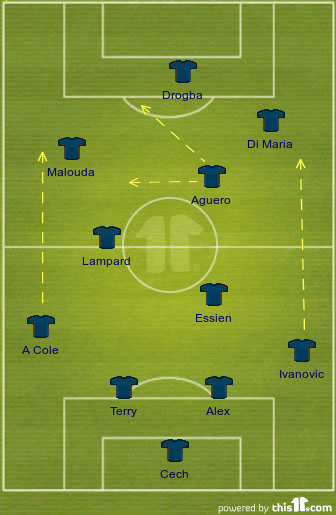
As can be seen I believe that this summer only two major signings are required - world class players admittedly. I have plumped for both Aguero and Di Maria to fulfill these roles respectively. First I will elaborate on my formation.
I have gone for a slightly asymmetrical 4-2-3-1 which would convert into a 4-4-1-1 during the defensive phase. I believe that Chelsea perform at their best with a variant of 4-3-3 and any major changes would not be beneficial to the team as a whole: evolution not revolution.
Defence: Cech will retain his place in goal and I would stick with the same back four with Cole providing extra width down the left supporting Malouda and Ivanovic (or Bosingwa when fit) performing a similar role to support Di Maria.
Midfield: Essien would be the nominal "defensive" midfielder but would be given license to push forward and use his dynamism. Lampard would play slightly left, as he currently does, but would perform a role more similar to his job for England where he helps to keep shape of the team with occasional bursts into the box. As he is playing alongside Essien instead of Mikel he would need to drop deep on occasions to cover for the forward runs from deep that Essien thrives on.
Attack: Further forward in my attacking four I have Malouda on the left, who is able to go both wide and provide crosses and come inside to support Aguero. Ageuro will be the sides creative "No. 10" and will be given license to play directly off Drogba, to go wide left or right or pick up the ball deep. I envisage him playing a similar role that Ancelotti had Kaka playing for Milan. On the right I have Di Maria who can provide width and pace down the right and cut in to use his stronger left foot as well as interchange with Aguero at will. All of this will provide the ammunition and movement that will allow Drogba to do the damage that he often inflicts.
Substitutes: Turnbull (GK), J Cole (Att), Carvalho (Def), Anelka (Att), Mikel (Mid), Kakuta (Att), Bruma (Def), Ballack (Mid), Sturridge (Att), Bosingwa (Def), Zhirkov (Def). With these subs and others I see enough ability to change things around throughout the season and to keep things fresh.
I strongly believe that this team and squad will have enough to challenge for major honors next season.
K.B.
Why Ferguson was right (and wrong)
I thought I would start my blog with an analysis of the second leg of the Manchester United vs. Bayern Munich Champions League Quarter-Final. To start with we should look at Man Utd's formation and team selection as this was the initial starting point for discussions.
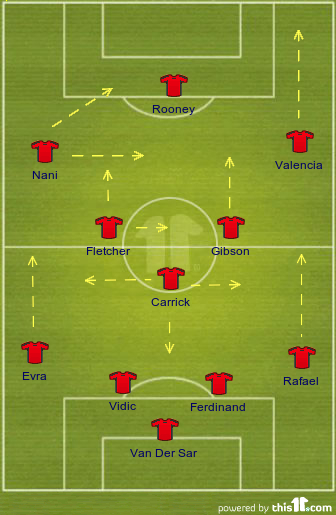
Once the game started it was apparent that this was quite clearly the right thing to do as Utd played a typical high-tempo pressing game that did not give Bayern the chance to settle as well as putting pressure on their incredibly fragile defence by attacking down the wings at pace. Man Utd's game plan appeared to be to overwhelm their opponents with speed and dynamism. The success of this ploy was seen by the number of raids that Rafael achieved against Ribery and Badstuber in the first half and the outright fear that seemed to strike Lahm when Nani had the ball at his feet.
When Utd went 3-0 up it appeared that Ferguson's tactics had been hugely successful. However as the game wore on it seemed that Ferguson's "gamble" was doomed to failure. I believe that in actual fact Ferguson got his tactics spot on until they went down to 10 men where his conservatism and decision to hold onto the lead meant that he effectively gave the ball to Bayern and enabled them to dictate the play. After Utd went down to 10 men he subbed off the ineffective Rooney and brought on O'Shea with the team lining up similar to that shown in the diagram below:
Prior to the sending off and substitution Utd had put pressure on the full-backs and had effectively prevented the danger men of Robben and Ribery from causing too much damage. As soon as the switch was made those two players came to the fore. Every time Utd got the ball they seemed to lose composure and with that the balance of power.
Bayern's midfield of Franck Ribery, Arjen Robben, Mark van Bommel and Bastian Schweinsteiger began to dominate possession and force Utd to make mistakes that ceded possession. Nani was isolated (yet still dangerous) and Valencia, Gibson, Fletcher and Carrick became totally ineffectual as an attacking force. It really was a case of "not it but when" Bayern would get the critical second.
Much of the press reaction has focused on what they call the failure of "Ferguson's gamble". Whilst there is something to suggest that selecting Rafael, Gibson and an injured Rooney in a big game like this was a gamble I think the first 35 minutes proved he was definitely correct. However I think Ferguson's biggest mistake was his failure to truly gamble and take the game beyond Bayern. If after Rafael's red card he had switched to the following formation the game could well have been won...
I believe that Ferguson should have made two substitutions: O'Shea on for Gibson and Macheda for Rooney. This would have meant that Utd reverted to a 4-4-1 but would have kept the pace and danger of Valencia and Nani focused down the wings, which would have meant that Robben and Ribery would have had something to worry about defensively as they did in the first half.
This team selection would also have meant that Carrick and Fletcher were able to go man on with van Bommel and Schweinsteiger who would not have been able to dominate possession as they did. With Macheda in upfront Utd would also have posed a threat with both pace and power and goalscoring ability: the time was most certainly not suited to Berbatov's notable talents.
As the game wore on I would have also considered bringing on Giggs for Valencia and switching Nani to play behind Macheda and make Giggs, Fletcher and Carrick play tight as a central three...with the purpose of trying to keep possession and not allow Bayern to dictate the tempo of the match. Making the changes as he did Ferguson created, as David Pleat argues, "a backs-to-the-wall mentality", which invited Bayern onto them. It was not Ferguson's gamble that failed but his conservatism.
K.B.

After the Chelsea match in the Premier League and the first leg of this contest there was much discussion and criticism of Ferguson's reliance on his old guard. During those two previous games he had selected Neville, Giggs, and Scholes in the same starting 11, which meant that whilst there was a lot of experience in the team there was a decided lack of dynamism on show - something that was especially apparent in the first half against Chelsea.
Going into this match it seemed Ferguson might again go with his previous plan of experience trumping youth. However knowing that Utd needed to win and there was no room for keeping it tight he appeared to realise that a positive approach was the best option. In order to implement this approach Ferguson selected a 4-3-3 brimming with youth with Gibson selected to start in the middle alongside Carrick and Fletcher, Nani and Valencia selected on the two wings, Rooney on his own upfront, and Rafael in place of Neville (who didn't even make the bench).
Going into this match it seemed Ferguson might again go with his previous plan of experience trumping youth. However knowing that Utd needed to win and there was no room for keeping it tight he appeared to realise that a positive approach was the best option. In order to implement this approach Ferguson selected a 4-3-3 brimming with youth with Gibson selected to start in the middle alongside Carrick and Fletcher, Nani and Valencia selected on the two wings, Rooney on his own upfront, and Rafael in place of Neville (who didn't even make the bench).
Once the game started it was apparent that this was quite clearly the right thing to do as Utd played a typical high-tempo pressing game that did not give Bayern the chance to settle as well as putting pressure on their incredibly fragile defence by attacking down the wings at pace. Man Utd's game plan appeared to be to overwhelm their opponents with speed and dynamism. The success of this ploy was seen by the number of raids that Rafael achieved against Ribery and Badstuber in the first half and the outright fear that seemed to strike Lahm when Nani had the ball at his feet.
When Utd went 3-0 up it appeared that Ferguson's tactics had been hugely successful. However as the game wore on it seemed that Ferguson's "gamble" was doomed to failure. I believe that in actual fact Ferguson got his tactics spot on until they went down to 10 men where his conservatism and decision to hold onto the lead meant that he effectively gave the ball to Bayern and enabled them to dictate the play. After Utd went down to 10 men he subbed off the ineffective Rooney and brought on O'Shea with the team lining up similar to that shown in the diagram below:
Prior to the sending off and substitution Utd had put pressure on the full-backs and had effectively prevented the danger men of Robben and Ribery from causing too much damage. As soon as the switch was made those two players came to the fore. Every time Utd got the ball they seemed to lose composure and with that the balance of power.
Bayern's midfield of Franck Ribery, Arjen Robben, Mark van Bommel and Bastian Schweinsteiger began to dominate possession and force Utd to make mistakes that ceded possession. Nani was isolated (yet still dangerous) and Valencia, Gibson, Fletcher and Carrick became totally ineffectual as an attacking force. It really was a case of "not it but when" Bayern would get the critical second.
Much of the press reaction has focused on what they call the failure of "Ferguson's gamble". Whilst there is something to suggest that selecting Rafael, Gibson and an injured Rooney in a big game like this was a gamble I think the first 35 minutes proved he was definitely correct. However I think Ferguson's biggest mistake was his failure to truly gamble and take the game beyond Bayern. If after Rafael's red card he had switched to the following formation the game could well have been won...
I believe that Ferguson should have made two substitutions: O'Shea on for Gibson and Macheda for Rooney. This would have meant that Utd reverted to a 4-4-1 but would have kept the pace and danger of Valencia and Nani focused down the wings, which would have meant that Robben and Ribery would have had something to worry about defensively as they did in the first half.
This team selection would also have meant that Carrick and Fletcher were able to go man on with van Bommel and Schweinsteiger who would not have been able to dominate possession as they did. With Macheda in upfront Utd would also have posed a threat with both pace and power and goalscoring ability: the time was most certainly not suited to Berbatov's notable talents.
As the game wore on I would have also considered bringing on Giggs for Valencia and switching Nani to play behind Macheda and make Giggs, Fletcher and Carrick play tight as a central three...with the purpose of trying to keep possession and not allow Bayern to dictate the tempo of the match. Making the changes as he did Ferguson created, as David Pleat argues, "a backs-to-the-wall mentality", which invited Bayern onto them. It was not Ferguson's gamble that failed but his conservatism.
K.B.
Subscribe to:
Posts (Atom)


